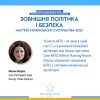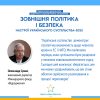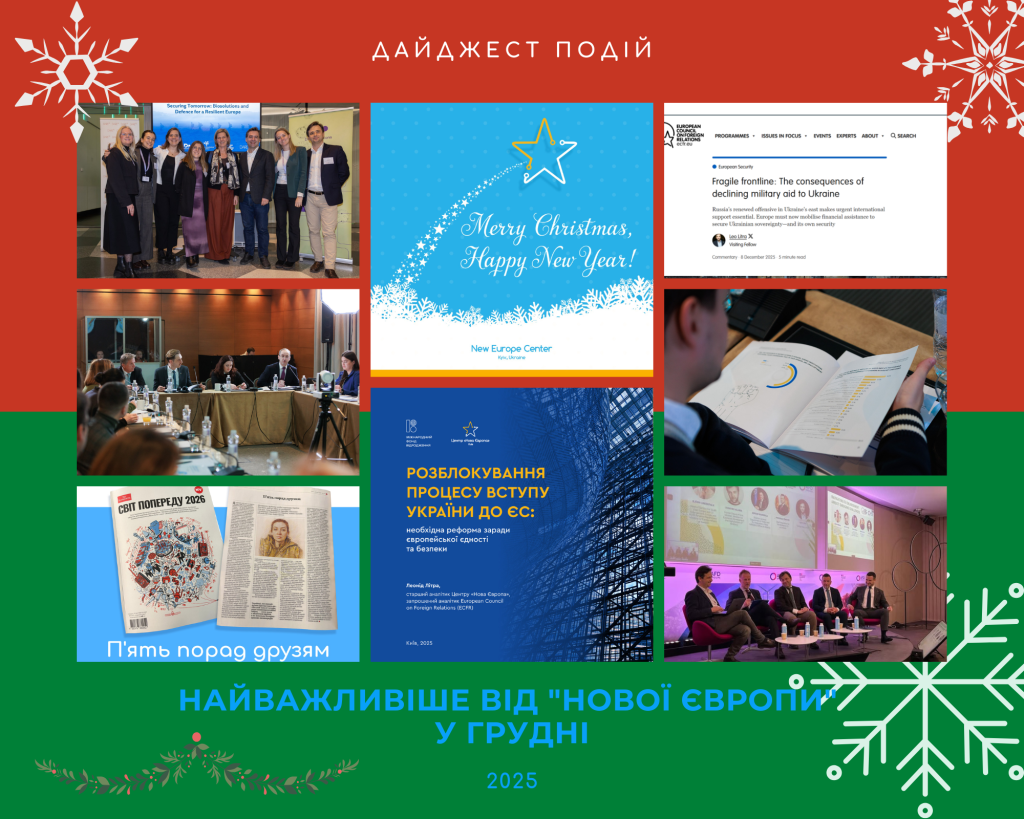The first session “Ukraine as a Game-Changer: Imagining an EU Enlargement from Inside Out” of the 4th EU Accession Exchange Forum focused on how Ukraine has reshaped the EU enlargement process, turning it from a stalled bureaucratic mechanism into a vital geopolitical project. Speakers discussed how Ukraine’s wartime reforms, public resilience, and regional leadership are redefining Europe’s understanding of unity, democracy, and security.
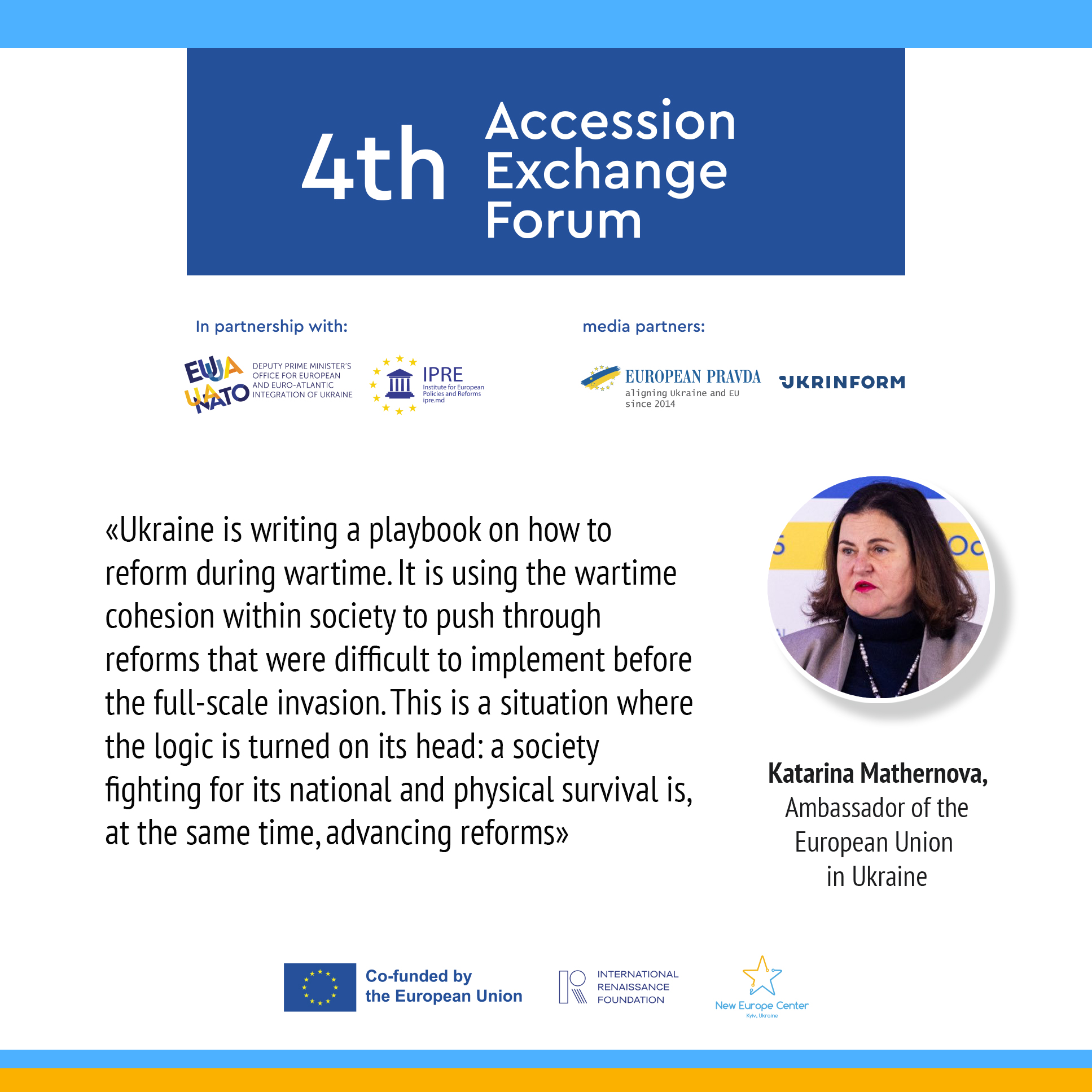
Katarina Mathernova, Ambassador of the European Union in Ukraine:
– Ukraine’s reforms under wartime conditions are unprecedented in speed and depth. Ukraine is writing the playbook on how to reform during wartime, using the cohesion of a nation fighting for survival to push through reforms that were once impossible. Anytime there is a criticism about slowdowns, one should be reminded that no other country has ever reformed this fast, in these conditions;
– Ukraine’s bid has revitalized enlargement, benefiting Moldova and Western Balkan countries. Before 2022, enlargement was barely discussed. Ukraine’s application on 28th of February, on the 4th day of full-scale invasion, changed that. Moldova and the Western Balkans are now advancing faster thanks to renewed political will within the EU;
– The future of Ukraine and the EU is inseparable – Europe’s security and identity depend on Ukraine’s victory.
The other key messages of Katarina Mathernova can be found here.
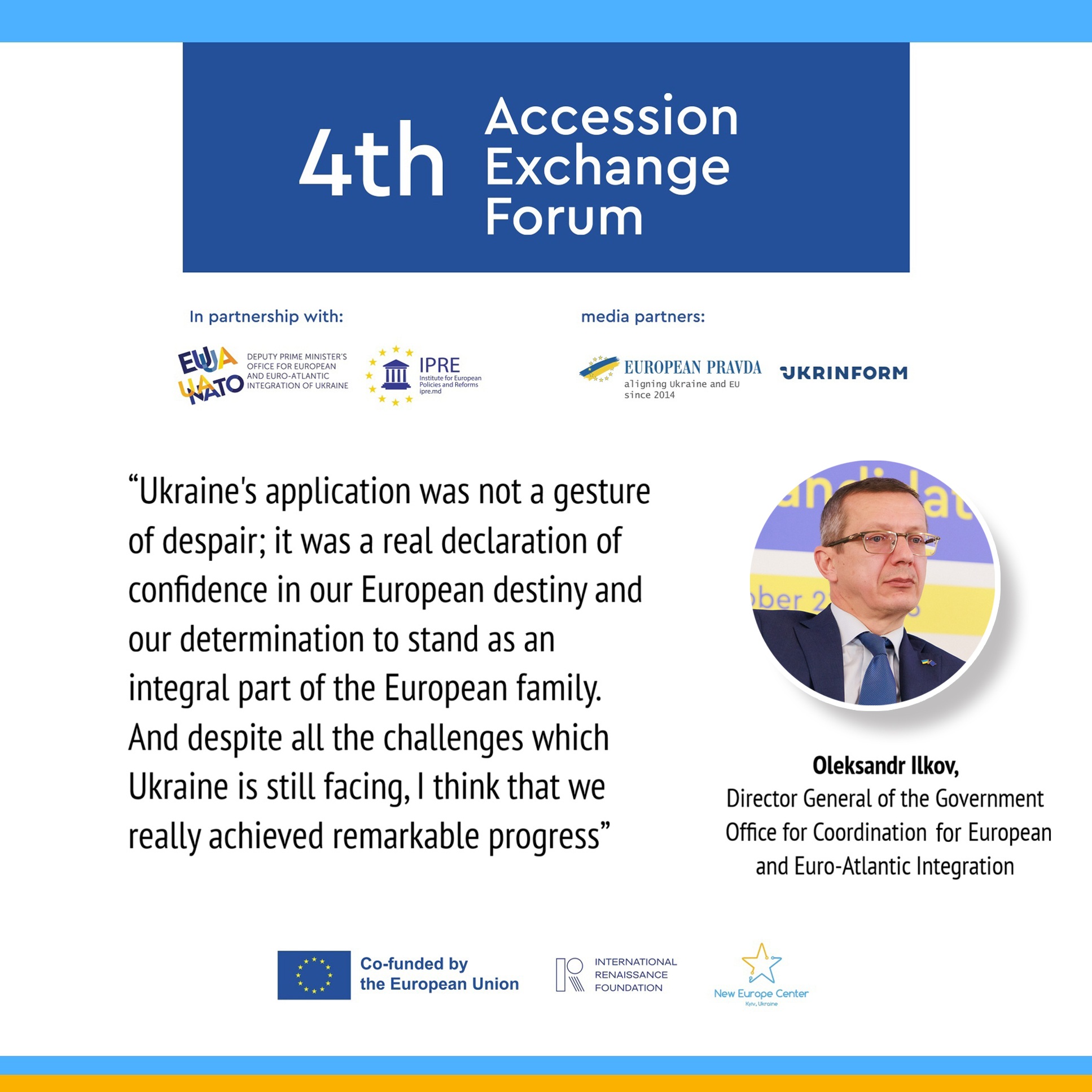
Oleksandr Ilkov, Director General of the Government Office for Coordination of European and Euro-Atlantic Integration:
– Ukraine does not ask for concessions – we ask for predictability. We need a clear and credible roadmap where every successful reform is rewarded with tangible progress. Not only through advances in the negotiation process, but also through deep access to the internal market, through broader participation of Ukraine in EU programs and with more structured financial support. And this is what we call a real merit-based approach, the very core of the negotiation framework;
– For the first time in history, a majority of EU citizens support Ukraine’s membership. And now, according to the recent results of Eurobarometer, Ukraine is a favourite candidate among all others in 14 member states. And I think that we cannot afford to lose this momentum;
– The next enlargement has become not only a matter of policy but geopolitical necessity for the entire continent. A geopolitical approach to enlargement does not replace a values-based one. It reinforces it. It is not a shortcut, but an accelerator. It answers the question, ‘why now?’ It’s because our common security and freedom depend on it.
The other key messages of Oleksandr Ilkov can be found here.
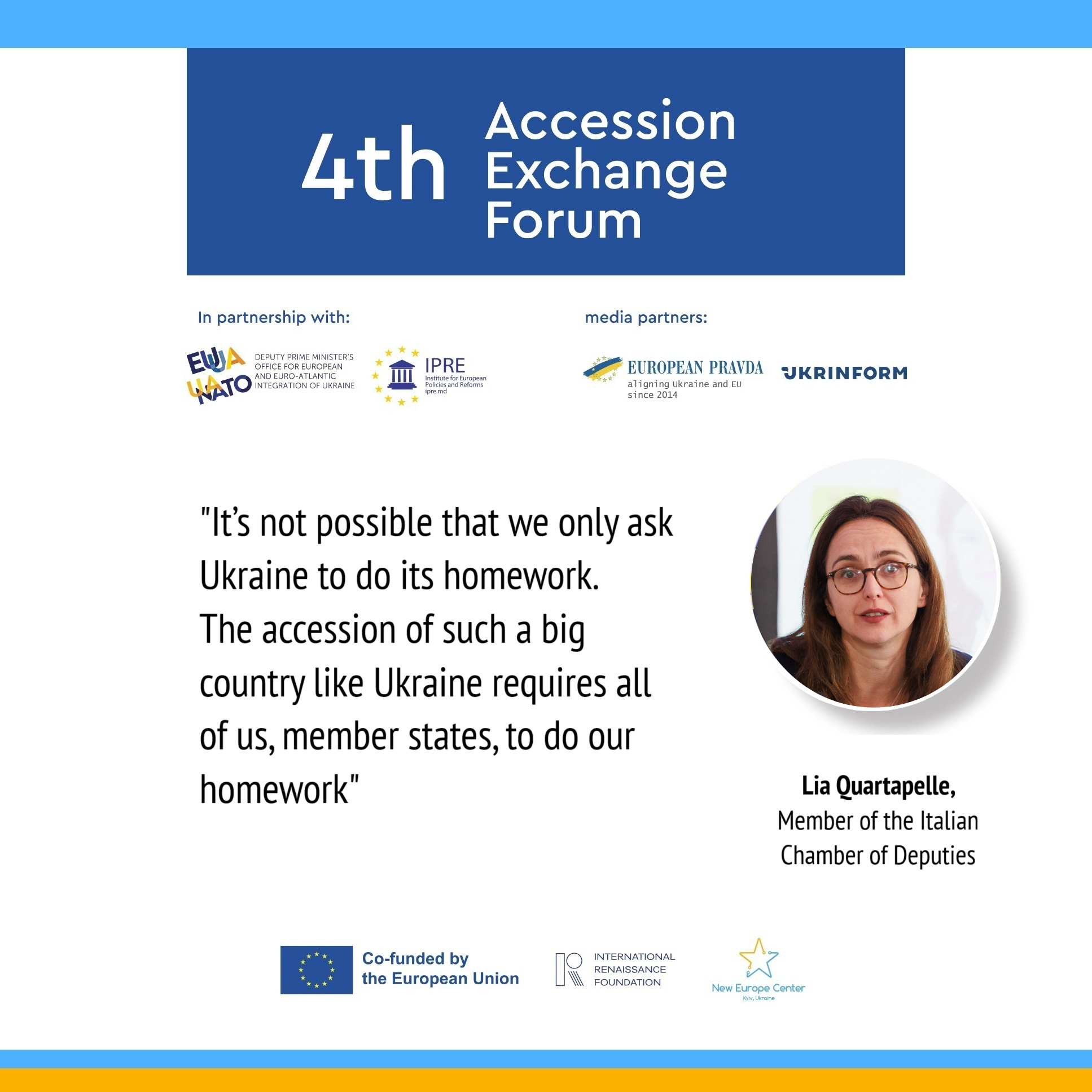
Lia Quartapelle, Member of the Italian Chamber of Deputies:
– Ukraine’s struggle and reform path are reshaping not only the EU enlargement process, but also the very meaning of Europe’s unity, democracy, and security. It is always an honor to be in Ukraine in solidarity with what Ukraine and its brave people are doing for the security of us all;
– The large-scale invasion posed some fundamental questions not only for Ukraine but for all of us as Europeans. Are we able to maintain peace in our continent, to guarantee security and well-being to our citizens in the face of external threats? These questions will change not only one part of our external policy, but how we work as a union;
– It’s not possible that we only ask Ukraine to do its homework. The accession of such a big country like Ukraine requires all of us, member states, to do our homework;
– It is clear to all of us that in the future we cannot have countries like Hungary and Ukraine in the same room, under the same rules. We have to rethink how we work on the democratic and commitment basis;
– When a big agricultural country like Ukraine enters, that budget will shift. We have to explain this to our public opinion right now, not later. We must tell the truth – we have to balance existential objectives like security with others like food security and landscape protection;
– We have to find creative ways of being together, of sharing objectives and values. This is part of what Ukraine will bring into the EU – new ideas, the energy we need, and more unity on fundamental values;
– On voting rights and EU reform, the EU must not allow countries that breach fundamental principles to retain equal power over those fighting for them. `It would be ironic to have inside the EU members with voting rights that don’t comply with fundamental principles, and members without voting rights who fought for those principles`.
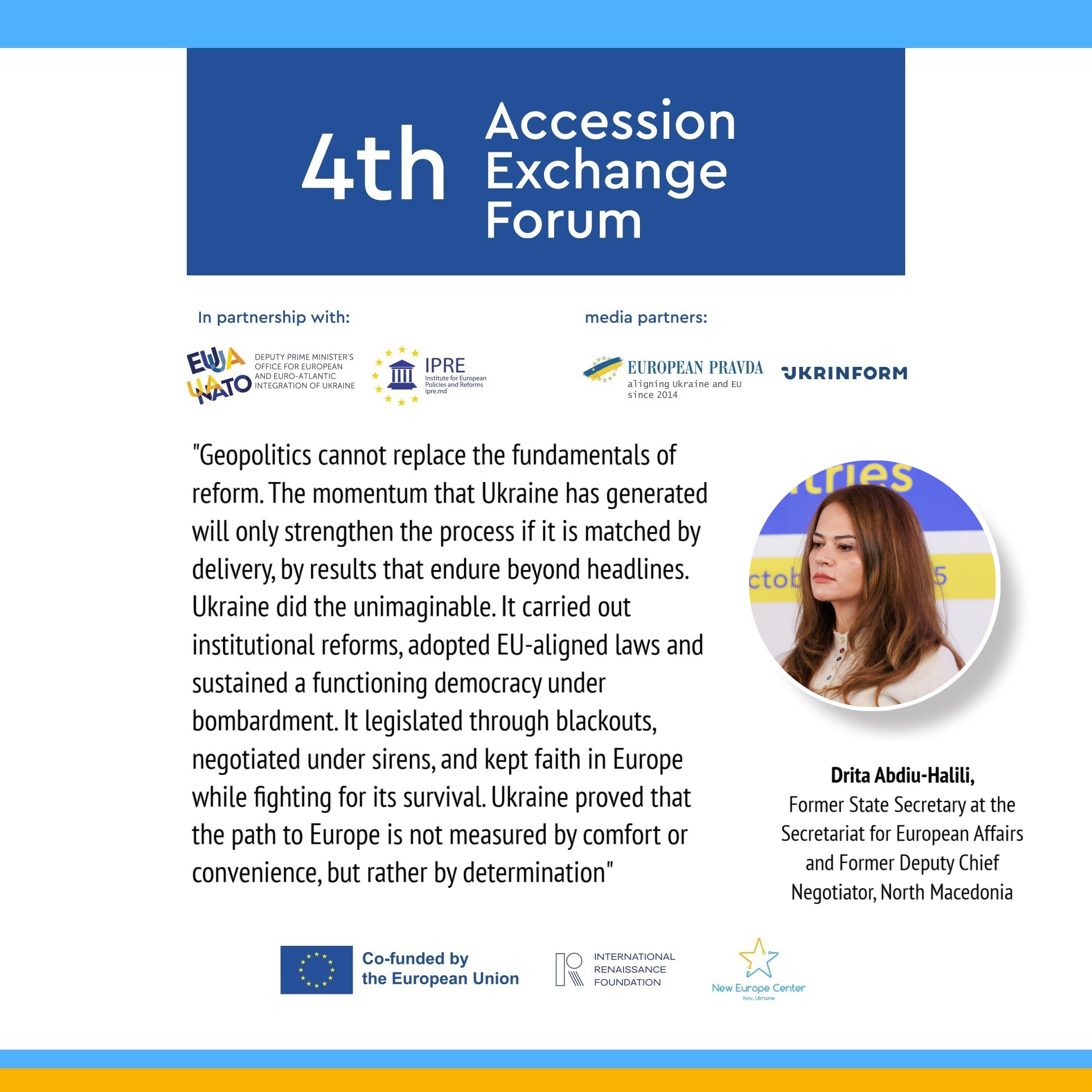
Drita Abdiu-Halili, Former State Secretary at the Secretariat for European Affairs and Former Deputy Chief Negotiator, North Macedonia:
– Geopolitics cannot replace the fundamentals of reform. The momentum that Ukraine has generated will only strengthen the process if it is matched by delivery, by results that endure beyond headlines. Ukraine did the unimaginable. It carried out institutional reforms, adopted EU-aligned laws and sustained a functioning democracy under bombardment. It legislated through blackouts, negotiated under sirens, and kept faith in Europe while fighting for its survival. Ukraine proved that the path to Europe is not measured by comfort or convenience, but rather by determination;
– For years, decades, the enlargement felt stalled. Technical chapters were opened and some provisionally closed, but the sense of political purpose has faded. This also influenced people’s perception and support for European integration in the Balkans, even though that support still remains high. The war in Ukraine changed that, suddenly the map of Europe looked unfinished. And the question also changed, not if the EU should enlarge, but how it could still justify delay;
– For the European Union, the challenge is to keep enlargement consistent, fair, driven by progress, not by fatigue or vetoes. For us as candidate countries, the task is to prove that we can build independent institutions, enforce rules and help societies transform;
– The EU needs unanimity for whatever creative solutions that could be found. This process has always been as much as technical, as it is political, but now we are more aware of it. And we need to navigate through this process in two lines.
– There’s lack of information of how much EU is supporting already all exceeding countries including Ukraine. This should be coupled with good communication on what this support is. It’s not only alignment of laws, there’s actually financial support building schools, infrastructure, helping youth and this should be communicated, to overtake space, so you don’t have time to read Russian media in the morning.
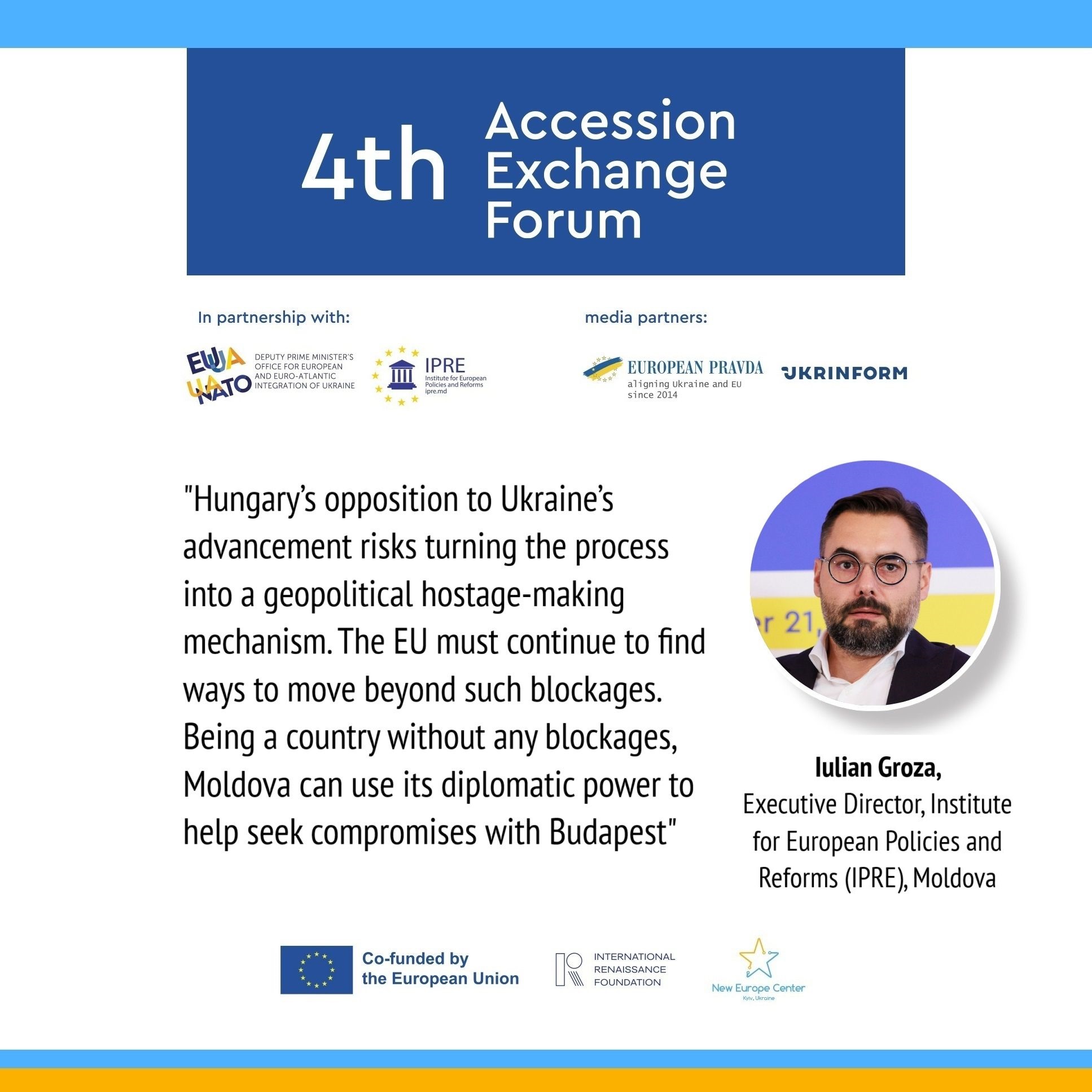
Iulian Groza, Executive Director, Institute for European Policies and Reforms (IPRE), Moldova:
– Ukraine’s courage, Moldova’s democratic determination, and Europe’s unity in response have given enlargement a new meaning. Not merely a project of transformation, but a guarantee of peace, democracy and resilience;
– For Moldova, Ukraine is not only a strategic partner and neighbour – it is truly a shield against Russia’s aggression, as it is for the whole of Europe. Our paths are interconnected politically, economically, and symbolically;
– Hungary’s opposition to Ukraine’s advancement risks turning the process into a geopolitical hostage-making mechanism. The EU must continue to find ways to move beyond such blockages. Being a country without any blockages, Moldova can use its diplomatic power to help seek compromises with Budapest;
– The EU needs to adapt its internal mechanisms to make enlargement more efficient. It doesn’t make sense to require unanimity for every technical step of the process. Unanimity should apply at the end, not at the beginning. We need a credible and flexible enlargement methodology;
– Ukraine and Moldova will bring the lively experience of defending freedom and democracy under pressure, a perspective that will enrich the European project;
– Institutional reforms alone are insufficient to move enlargement forward. Political courage and strategic decisions from EU leaders are essential. It’s very difficult to address political problems with technical solutions. At some point, these issues must be solved politically, directly, through leadership and dialogue.
The session was kindly moderated by Sylvie Kaufmann, Editorial Writer, Le Monde, France.
Watch the full recording of the Forum on New Europe Center`s YouTube channel.
The EU Accession Exchange Forum is organized by the New Europe Center in partnership with the Office of the Deputy Prime Minister for European and Euro-Atlantic Integration of Ukraine, the International Renaissance Foundation, and the Institute for European Policies and Reforms (Republic of Moldova), with Ukrinform and European Pravda serving as media partners. The EU Accession Exchange Forum is taking place with EU support, within the EU-funded “Whole-of-Society Accession” project implemented by the International Renaissance Foundation.



